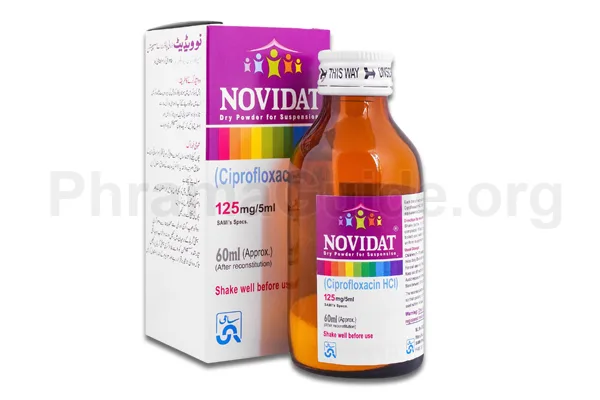Novidat syrup is an antibiotic medication that is primarily used to treat a variety of bacterial infections. It belongs to the class of drugs known as quinolone antibiotics. The following are some common uses of Novidat Syrup:
- Urinary Tract Infections (UTIs): Novidat syrup is often used to treat uncomplicated UTIs caused by susceptible bacteria. It can help eliminate the infection and relieve symptoms such as frequent urination, pain, and burning sensation.
- Respiratory Tract Infections: Novidat syrup may be used to treat respiratory tract infections like bronchitis, pneumonia, and sinusitis caused by certain susceptible bacteria.
- Gastrointestinal Infections: Novidat syrup can be prescribed for gastrointestinal infections such as traveler’s diarrhea caused by certain bacterial pathogens.
- Skin and Soft Tissue Infections: It can be used to treat skin and soft tissue infections caused by susceptible bacteria, including cellulitis, abscesses, and wound infections.
- Bone and Joint Infections: Novidat syrup may be used as part of the treatment regimen for bone and joint infections caused by susceptible bacteria.
- Sexually Transmitted Infections: In some cases, Novidat syrup may be used to treat certain sexually transmitted infections, such as gonorrhea.
- Eye Infections: Novidat eye drops or ointment are commonly used to treat eye infections, including conjunctivitis and corneal ulcers caused by susceptible bacteria.
Off-label Uses of Novidat Syrup
- Off-label Use in Children: Novidat syrup is sometimes used off-label to treat certain bacterial infections in children when no alternative antibiotics are available or appropriate. This may include conditions such as complicated urinary tract infections or specific respiratory infections caused by susceptible bacteria.
- Off-label Use in Specific Bacterial Infections: In some cases, Novidat syrup may be used off-label to treat certain bacterial infections that are not explicitly mentioned in the official prescribing information. This may include infections such as prostatitis, sexually transmitted infections (when other first-line antibiotics are not suitable), and certain skin and soft tissue infections caused by susceptible bacteria.
- Off-label Use in Chronic Obstructive Pulmonary Disease (COPD) Exacerbations: Novidat syrup has been used off-label in the treatment of acute exacerbations of chronic obstructive pulmonary disease (COPD) caused by certain bacterial pathogens. However, the use of Novidat for this purpose is not universally accepted and may vary depending on the clinical situation and antibiotic resistance patterns.

What is Novidat?
Novidat syrup is one of the leading brands of Ciprofloxacin in oral liquid form, manufactured and marketed by Sami Pharmaceuticals (Pvt) Ltd, Pakistan.
Novidat Alternatives : Other Similar Brands
The following are some alternative brands of Novidat Syrup and their manufacturers.
- Ciplet : Indus Pharma (Pvt) Ltd, Pakistan.
- Cipesta : Getz Pharmaceuticals (Pvt) Ltd, Pakistan.
- Bionip : Pharmix Laboratories (Pvt) Ltd, Pakistan.
- Inoquin : Barrett Hodgson Pakistan (Pvt) Ltd, Pakistan.
- Affif : Neutro Pharma (Pvt) Ltd, Pakistan.
- Hiflox : Hilton Pharmaceuticals (Pvt) Ltd, Pakistan.
- Mytil : Wilsons Pharmaceuticals (Pvt) Ltd, Pakistan.
- Hipro : Helix Pharma (Pvt) Ltd, Pakistan.
- Ciproquine : Macter International.
- Algocin : AGP Pharma, Pakistan.
- Cycin : High Q Pharmaceuticals (Pvt) Ltd, Pakistan.
Novidat : Available Formulations and Strengths
Presently, Novidat is available in Syrup, Tablet, and Infusion Forms.
Novidat Syrup (Dry Powder) : 125mg and 250mg strengths.
Novidat Tablet : 250mg and 500mg Strengths.
Novidat Infusion: 200mg/100ml and 400mg/100ml strengths.
Who Should Not Use Novidat?
There are some important contraindications that should be considered before using Novidat Syrup.
Hypersensitivity or Allergy: Individuals who have a known hypersensitivity or allergy to quinolone antibiotics (such as ciprofloxacin, levofloxacin, and moxifloxacin) should avoid its use.
Tendon Disorders: Novidat Syrup may increase the risk of tendonitis and tendon rupture, particularly in the Achilles tendon. It is contraindicated in individuals with a history of tendon disorders related to quinolone use.
Central Nervous System Disorders: Novidat Syrup may have the potential to cause central nervous system (CNS) effects such as seizures, increased intracranial pressure, and psychiatric reactions. It should be used with caution or avoided in individuals with a history of CNS disorders.
Myasthenia Gravis: Novidat Syrup can worsen the symptoms of myasthenia gravis, a neuromuscular disorder characterized by muscle weakness. It is contraindicated in individuals with this condition.
Children and Adolescents: Novidat Syrup is generally not recommended for use in children and adolescents, as it can potentially affect bone and joint development. However, it may be used in certain circumstances when other treatment options are limited.
Pregnancy and Breastfeeding: Novidat Syrup is generally contraindicated during pregnancy and breastfeeding due to potential risks to the developing fetus or infant. However, in certain situations, such as severe infections, the benefits, and risks should be carefully evaluated by a healthcare professional.
What is the Recommended Daily Dosage of Novidat Syrup?
The daily recommended dose of Novidat syrup varies depending on the patient’s age, weight, and the severity of the infection. However, the general dosage is as follows:
- Children: 10 to 20 mg per kg of body weight every 12 hours.
- Adults: 250 to 750 mg every 12 hours.
How Novidat Works?
Novidat is a broad-spectrum antibiotic from the fluoroquinolone class. Its mode of action involves inhibiting the activity of bacterial enzymes called DNA gyrase and topoisomerase IV, which are essential for DNA replication, transcription, repair, and recombination in bacteria. By interfering with these enzymes, Novidat disrupts the bacterial DNA replication process, ultimately leading to the inhibition of bacterial growth and the killing of susceptible bacteria.

Leave A Comment